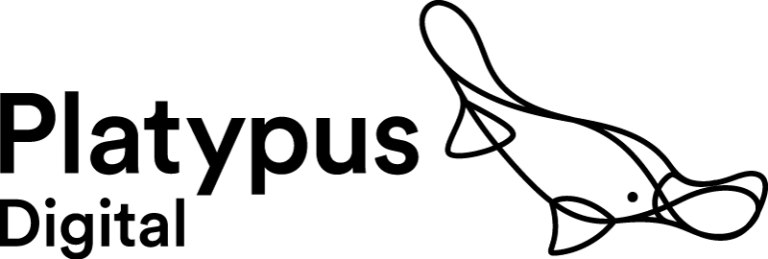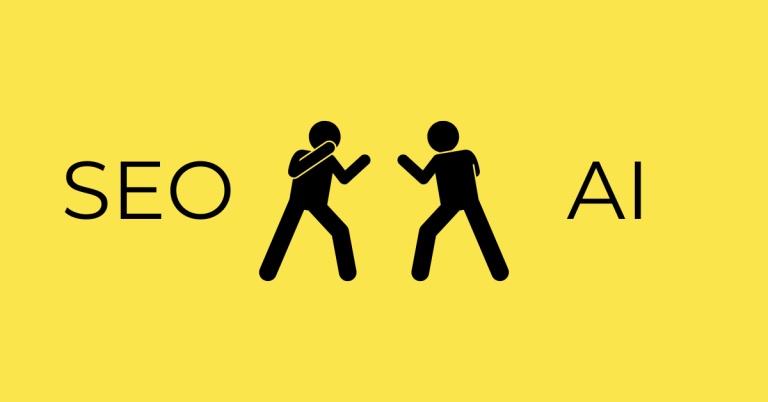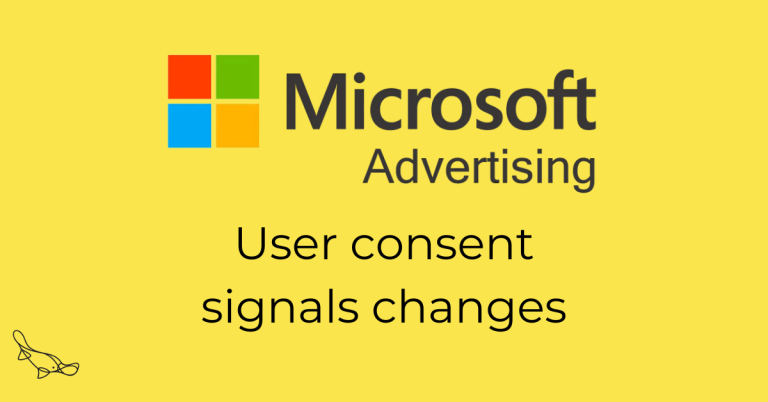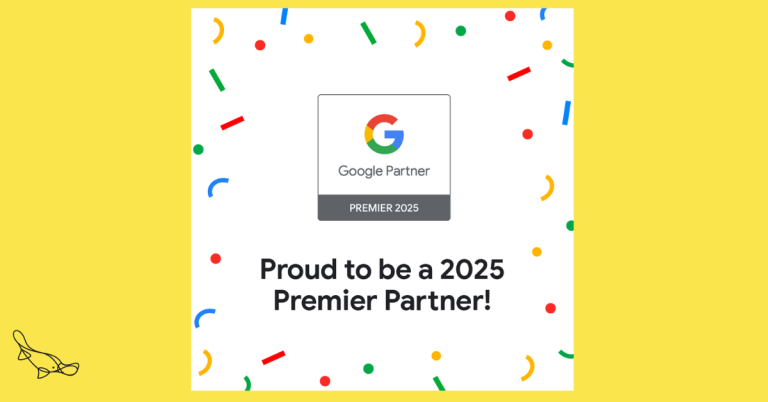AI-powered search is rapidly evolving.
After years of SEO and optimising for organic search (check out our top SEO tips for charities and why your charity should invest in SEO), we’re moving to a world where SEO is being considered alongside GEO – Generative Engine Optimisation, or optimising for AI search platforms.
There are now a range of tools and platforms offering a search experience powered by AI. From large language models such as ChatGPT and Claude, AI overviews in Google, to dedicated AI search platforms like Perplexity AI.
But the details on how all of this works have been scant so far.
Each platform has a variety of data sources, target audiences and user experience goals.
To add to this bewilderment, each platform is constantly being updated and tweaked.
This all means keeping on top of optimising your website to benefit from these emerging technologies is a real challenge.
AI search platforms
When it comes to AI search, we generally speak about two main types of AI.
First, there’s Large Language Models like ChatGPT and Claude. These try to provide a conversational experience. They try to answer questions as you might experience as if you were talking to a human. These tools currently don’t usually cite their sources of information.
Then there are search platforms like Perplexity AI and Search Generative Experience (SGE) in Google. These try to provide a more traditional search engine experience with AI enhancements. These tools now actively promote where they get their information from.
Check out Matt’s post on LinkedIn outlining how AI powered search results are impacting charity health content in particular.
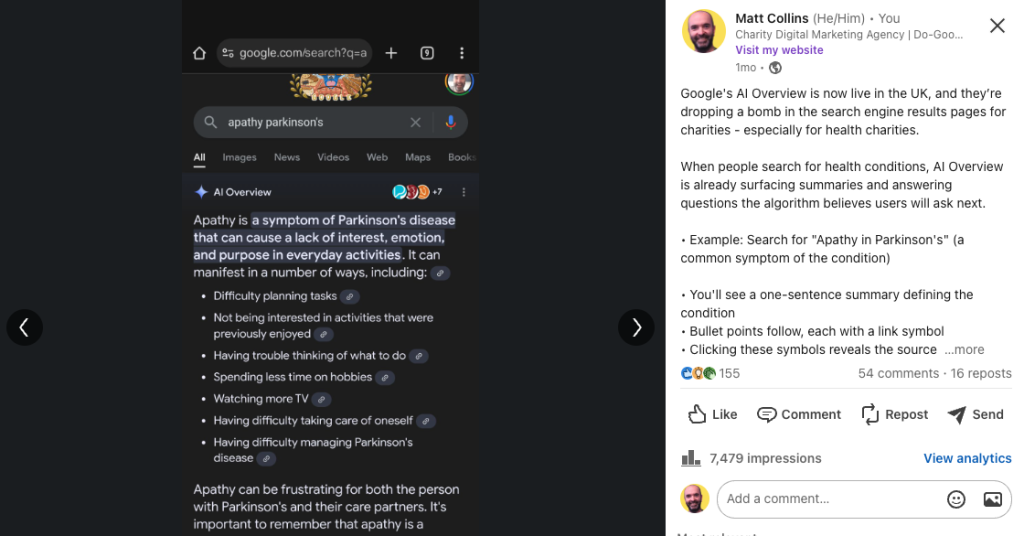
What we know so far
- Public facing website content sits at the core of all of these platforms. They form the basis of the training data for each tool.
- The popularity of these platforms is growing. More users are now looking beyond traditional search engines to answer their questions.
- Google is using AI to understand complex queries and provide more relevant results. They’re rolling out AI powered overview results in their SERPs. The US is their main testing area, and the UK and Europe have started to see more AI features recently.
- AI overviews now appear more regularly in Google for topics such as health and finance.
- Mistakes and hallucinations can and do regularly occur in the information provided by AI platforms. The technology is still evolving, but misinformation can be easily spread if outdated or incorrect information is used to feed these AI tools.
How to optimise for AI search
The core principles of SEO are your friend if you want to optimise your site content for AI search.
Develop your brand awareness and domain authority
Charity website content often focuses on health, finance, and socio-economic topics.
Luckily, AI search tools are looking to cite the best sources of information for queries relating to these topics.
So one of the best ways of optimising your content for AI platforms is to make sure your organisation is seen as the leading authority on the topics you cover.
You can do this by developing your brand awareness and domain authority. Here’s a few ways to start.
- Develop your backlink profile, such as using traditional PR to acquire backlinks to your website
- Building out your social media presence and engaging with your community across a range of platforms
- Shout about the fantastic work you already do. Highlight the impact you’ve had, research you’ve carried out or funded, campaigns you’ve run, and the partnerships you’ve built
Create quality, comprehensive content
Improving your position in traditional search rankings will position you well for AI platforms.
Creating high-quality, authoritative content has been the best way to get discovered through search long before ChatGPT was a thing, and it still is today.
So develop content that:
- provides clear, trustworthy information on your topic
- uses the experience and expertise of your whole team
- is highly relevant to the keywords you’re looking to rank for
- includes citations and author credentials to establish authority
- breaks down complex topics into easy-to-understand sections
Keep your content fresh
As with traditional search engines, AI search platforms aim to provide up to date answers and information to their users.
This is part of their approach to avoid promoting potentially harmful incorrect information, especially around health, financial info and socio-economic topics.
So it’s crucial that you regularly review and update the content on your site to make sure you appear in these updates.
Set regular check in points to make sure the information you’re providing is in line with the latest research and guidance in your area of expertise.
Focus on specific, long-tail keywords
AI platforms are particularly good at understanding longer, more complex queries.
Here’s why this matters:
1. Natural language processing: AI can interpret the intent behind these longer phrases. They can understand context and nuance better than traditional keyword-matching systems.
2. Question answering: Many long-tail searches are questions. AI is designed to find and synthesise answers from multiple sources to answer these questions.
3. Less competition: Fewer websites target very specific long-tail phrases, potentially making it easier to rank for these terms.
So identify and target long-tail keywords relevant to your area as part of keyword research. Use the expertise of your staff to understand which topics and questions are important to your audience.
Use structured data
Search engines and AI platforms love easy to process and easy to understand information.
So the easier you make it for these platforms to understand your information, the more likely they’ll use your information over a competitor’s website.
You can help this by implementing structured data markup to help search engines better understand your content for structured data related to:
- article and blog post
- medical webpage and medical condition
- events
- product
Set KPIs for generative search results
Once you’ve done all the above, it’s time to set top-level KPIs for your charity ‘ranking’ better in generative AI search results.
The variety of LLMs and the fact that questions are usually much longer than mere keywords make this very tricky. Good prompts are typically long and detailed, so will vary from person to person a lot.
But make a start. You could agree on the prompts as a team, and check where your content appears in the results across ChatGPT, Claude and Gemini once a quarter.
You could also re-test when the parent companies release new models.
These won’t be perfect KPIs. But the process of agreeing on some top level basic prompts that people might use that align with your audience search behaviour is a great place to start.
Stay adaptable
The entire AI search landscape is constantly evolving. New models are coming out thick and fast. Investment rounds are billions of dollars a go. The curve is exponential.
So stay up to date with the latest developments in AI search, and make sure your site isn’t left behind.
Do we even need traditional SEO anymore?
All this AI stuff can be a bit overwhelming. Working in the world of digital marketing at the moment, it can feel like everyone has moved away from search engines completely.
Fear not. Traditional search engines will continue to play a significant role in online search behaviour.
Platforms like Google still have a huge user base. Decades of defaulting to Google search for most people will take time to fully move away from.
LLM hallucinations (like Google recommending you put glue on your pizza) mean most people doubt the reliability and accuracy of AI powered search results.
People want a simple search experience, and to be able to trust the information they find.
So while it’s great to act on the changes that AI has brought to the industry, it’s still essential to optimise for traditional organic traffic.
This is particularly true for charities.
A large proportion of your audience will likely want to come to your website because it’s not an AI generated response. They want to come to you because of who you are as an organisation.
Your website and the content you produce should be a comfort to your audience, knowing that it’s reliable, up to date, and written by experts. Focus on this, and you’ll see great results for both AI platforms and search engines.
